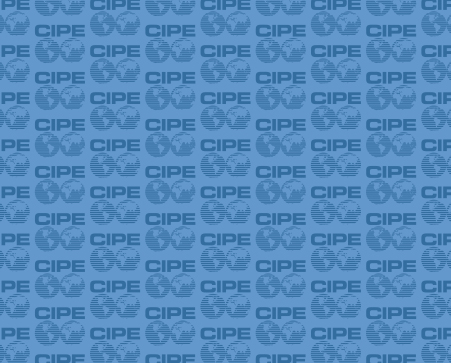
Lawrence Yealue, II. is a CIPE-Atlas Corps Think Tank LINKS Fellow at Accountability Lab
In Liberia, female participation in decision-making has long been limited to a few women who have fought tirelessly to be heard. Liberian society needs to take a critical look at the role of women across traditional, economic, political, religious, and social interactions. It is time for this silence to end and a new politics of inclusiveness and ownership be rolled out. This requires real decision-making by women rather than a semblance of participation and involvement.
Traditionally, Liberian women have been limited to domestic work, which involves fishing, gathering firewood, cooking, and cleaning. During town meetings, the women were given limited opportunity to contribute their ideas and were rarely selected as village chiefs. In ceremonies, they were expected to decorate and cook. Sadly, many of these traditions continue today.
Today, often the best economic opportunity for women is to work as petty traders, where they face great challenges: sleeping on the cold ground in cramped rooms to sell their goods in bad, often muddy conditions. Frequently involved in trading across borders, they bear great risk in traveling to Ghana, Nigeria, and beyond.
Women move our economy, but the economic decisions that affect them are still mostly made by men. How will the economy progress if the decisions around it are not inclusive?
Despite these circumstances, Liberia elected the first female president in Africa, Ellen Johnson Sirleaf, who assumed the presidency in 2006. Before that, Ruth S. Perry, head of the last Interim Government, lead Liberia on a path to peace after the bloody, 14-year civil war that began in 1989. However, you can count on one hand the few other women who play a role in political decision-making in the male-dominated system. Most of their advisers are men, deeply influencing their decisions. The same is true in the country’s religious leadership.
Nevertheless, Liberian women are active, strong, and enterprising members of society. They are hugely interested in getting involved in efforts for social good, even though the opportunities to do so are very limited. Through my fellowship at the Accountability Lab, I strive to find creative ways to help them understand their rights, share their voice, and play an important role in building accountability.
For example, the Lab helped set up the Accountability Film School in Monrovia, which teaches young women how to create films that tell their stories and call communities and power-holders to action. One of the participants, Dorcas, lost her family in Liberia’s civil war and was on the street, struggling to make ends meet when she found the class. She created a short documentary called “Say It” about sexual harassment in high schools – an issue she has suffered from personally – and she went on to win the viewer’s choice award at our film festival and teach future sessions of the film school. This is what women’s empowerment looks like.
Thinking of the challenges I have seen women in Liberia go through, I am deeply committed to this cause, and believe that as a man, I have an important role to play. Men are the biggest obstacle to change on this issue. We must rethink how our traditions and culture affect women’s rights, and in order to create real change, men must also join the conversation.
Just as political accountability cannot be achieved without a role for both citizens and government, women’s empowerment cannot be achieved without both involvement by both women and men. Women’s Day should be celebrated in rooms full of women and men – because this has to be a collective effort to ensure everyone in society is valued and systems change to ensure fairness and inclusivity. Men have to be the biggest advocates for women’s essential and equal role in society. I’m adding my voice to that call for change.
CIPE-Atlas Corps Think Tank LINKS Fellowship brings talented young professionals with strong research backgrounds to shadow researchers and experts at leading U.S. think tanks for six months. W. Lawrence Yealue, II is serving at Accountability Lab
Published Date: March 13, 2015